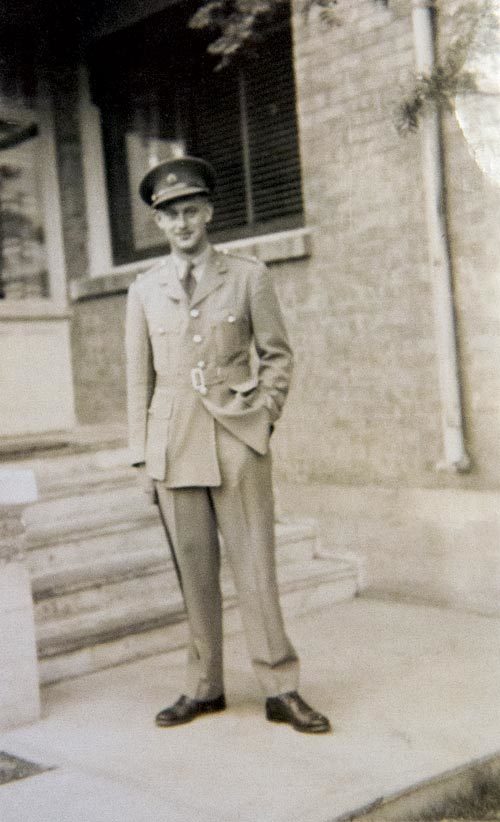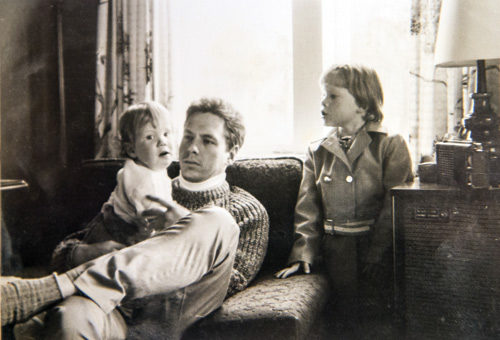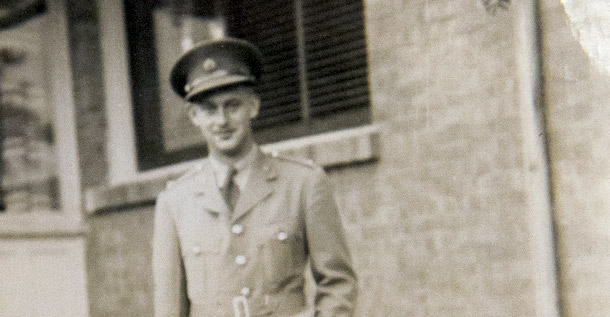
Ever since I could recall, there was a family photo that intrigued me: It showed my dad at about 10 months old, sitting on the grass, dressed in a fancy outfit, looking up at someone who was torn from the picture. Beside him, all that was left was a set of legs wearing pressed slacks and boots polished to a military shine.
Over the years, I asked my grandmother about the man missing from the picture. Her answers — “he’s no one” or “he doesn’t matter” — betrayed just enough emotion that I couldn’t let it go. Later, when I asked yet again, she said the man was called Lorris and then snatched the photo from me and replaced it with a much coveted, but completely off-limits, Harlequin Romance.
Growing up in western Canada, I had grandparents, aunts, uncles, cousins, and a plethora of more-distant relatives, all of whom gathered regularly for a progression of holidays, weddings, baptisms, graduations, and funerals. I’m not sure when I started to notice that one segment of my family was entirely absent, but I learned if I asked my grandmother about my dad’s father, I got a blistering silence or a “mind your own business” in response.
One day, when I asked why she became a nurse, she explained that when she was young, women could be schoolteachers, nurses, nuns, or wives, and she hadn’t been in a hurry to marry. When I tried to ask her about a bombshell a second cousin had dropped — that Grandma wasn’t just a nurse but also a nun — she ignored my question by reaching high up on her bookshelf and letting me look through her much-loved book on the royal family. We debated whether Prince Andrew or Prince Edward was more handsome.
Because she was always reluctant to talk about herself, I had to piece together my grandmother’s story through rumor and family lore. She entered the convent as a young woman and became a nursing sister during World War II. Through the war, she was stationed at the University of British Columbia and worked with young soldiers. While there, she wrote her sister that she’d fallen in love with a soldier named Lorris Selkirk. Sometime later, she bore his child. The relationship didn’t last, and she was left with a fatherless son and a harsh bitterness that followed her through life.
She was excommunicated by the church for refusing to give her son up for adoption, and my dad’s early years were a blur of constant movement as she traveled to a series of remote northern Canadian communities under assumed identities. To hide her shame, sometimes she claimed to be a war widow; other times, she posed as a nun and found work in hospitals where the need for nurses was so great no one asked questions. To maintain this fiction, of course, she couldn’t have my dad around. They’d move into a boarding house and, having secretly made arrangements with the proprietors, she would disappear in the middle of the night without a goodbye, sometimes not returning for months. Later, she told my mum she did it this way so he wouldn’t notice and be sad.
As an adult, I visited a Catholic hospital on a remote First Nations reserve were she’d worked for a year or two. Sure enough, I found her name in the records — as a nun. My dad would have been 6.

By the time my dad was 12, their peripatetic lifestyle came to an end. My grandmother married and started a new life with the kind pharmacist I knew as my grandfather. She died when I was a teenager, and with her went the answers to many questions I would like to have asked.
Years later, I was assigned a magazine story on how to use the internet for genealogical research. All I knew about my paternal side was the Selkirk name. So I visited my dad to see what he knew. He cheerfully unearthed a baby book showing a family tree with both his father’s and paternal grandparents’ names. I was surprised these mysterious names even existed. But when I asked him about them, he said, “They didn’t want me and my mother. So I don’t need to know anything about them.”
The first few times I found new information, I shared it with him. He was fascinated to learn our Canadian history began with the arrival of Robert Selkirk, a Scottish farmer born in 1812. Robert, along with his wife Catharine, raised at least five Quebec-born children on an Ontario farm; one of them was my direct ancestor James.
But when I started to tell him about James, who was his great-grandfather and who was still alive when he was born, my dad said he didn’t care. When I offered to send links to the high school picture of his father I’d unearthed, he told me he didn’t need to know what his father had looked like. “We were hurt enough by that family. I prefer to respect my mother’s memory,” my dad wrote back. “So perhaps you could leave me out of your genealogical research.”
I thought I was done. Genealogy had given me what I expected: It had connected me to the long-dead past. But then modern media did its thing, and a surprise connection to a present-day relative arrived in my inbox:
Dear Diane, I am a great grandson of James and Wilhelmina Selkirk. My Grandma was Ola, who was born the year after Earle, your great-grandfather. —Tom
The fact that my grandmother gave my dad his father’s surname has always puzzled me. If she wanted, she could have easily hidden that information. But both my sister and I got the impression that, despite her reticence to talk about it, the Selkirk name was important to her. So much so that we both kept the name when we married and then passed it on to our own children.
So I quickly emailed Tom back. After all, he was family. And within a few minutes, thanks to a link he had sent, I was looking at photos from five generations and 150 years of my family’s life in Canada.
Then I got another note from Tom, apologizing for “letting the cat out of the bag.” He explained he’d been at a family gathering and mentioned meeting me to my dad’s 82-year-old aunt Marilyn, who was shocked. She told him she’d tried for years to find her older brother’s unacknowledged child.
Marilyn and I exchanged emails for several months. Hers were long, breathless streams of consciousness which jumped from childhood memories to old ancestral history to current stories about relatives I didn’t know. She would also send me packages in the mail filled with exuberant sketches, photos of her paintings, and other keepsakes. My letters back were briefer — the only history I had to share was my own.
I forwarded my dad all the emails, telling him he could always delete them if he really didn’t want to know anything. Marilyn had told me her deepest wish was to meet her long-deceased brother’s son. When my dad refused, I arranged for my sister and me plus our two teenaged daughters to meet her in his place.
When we arrived, Marilyn’s makeup was impeccable, and her clothes looked like they’d come off a fashion runway. She surprised us by planning a party for that first meeting. Her house was full of flowers and food, as well as a constant stream of people. I expected to encounter suspicion — or at least questions — about how I knew we were family, but instead we got a warm and happy welcome. It was joyful, but also heartbreaking. I couldn’t understand why my father and grandmother had never been wrapped into this loving family.
As the party slowed, Marilyn became pensive and nervous. Showing me photos, she told funny stories about her brother, including the fact that he hated sandwiches (a quirk that matched my own). She explained where my height, hair color, and love of bagpipes came from. My father, we discovered, looked remarkably like his father, putting to rest doubts no one seemed to have.
After asking our girls to leave the room, Marilyn finally filled me in on the details of the scandal. Her mother, it seemed, had been horrified her 19-year-old son had fathered a baby with a much older woman. (Not only was my grandmother 32 at the time, but she was of a different faith — it’s not clear if they even knew she was a nun.) While Lorris had initially taken responsibility for his son, his mother suggested he might not have been the only man in my grandmother’s life.
A humiliating court case followed. This was well before the era of paternity tests, and my grandmother was forced to swear in open court that Lorris was indeed her son’s father. Even with the court finding in her favor, the Selkirk family wouldn’t accept her. Lorris had child support garnished from his army wages, and his mother blamed my grandmother for the black mark this left on his record. Because of the dishonor, he never advanced the way he was expected to in the army. He went on to marry and have five other children — keeping my dad a secret from them all. My grandmother refused to ever let Lorris see his son again.
I had a new empathy for my grandmother. I could easily imagine her — that she’d found love and then had to go through such public rejection. Marilyn, who was only a child when my dad was born, felt guilty by association. The impropriety, which Marilyn thought was too racy for the girls to hear, seemed so insignificant in light of all the pain it caused.
People are warned when they reach out to solve family secrets that they might not always like the answers. Adoption agencies, genealogists, and now some of the companies that provide DNA tests caution that not all connections turn out to be happy ones. Love and forgiveness seem like such simple answers in retrospect — but it still took more than 75 years for my aunt to find her family.
Recently I sent my dad a note with a phone number, reminding him his aunt is now elderly and that if there’s a part of him that wonders about her, he might want to get on with it. I thought that my email would end up wherever the other ones about his family went, but instead, a few days later, I got a brief response back: “I called. She’s a fascinating lady. I don’t know why I waited so long. Thank you.”
Have you uncovered amazing tales about your ancestors? Leave your stories in the comments below.
Diane Selkirk’s last article for the Post was “Our Life on the Water in the March/April 2015 issue. For more about the author, visit dianeselkirk.com.
This story appears in the March/April 2018 issue of The Saturday Evening Post. Subscribe to the magazine for more art, inspiring stories, fiction, humor, and features from our archives.
Become a Saturday Evening Post member and enjoy unlimited access. Subscribe now




Comments
August 25,2029
I have a mysterious murder by my paternal grandfather I know very little about. The only facts I have is that he apparently murdered my paternal grandmother with a ax/hammer. He then went after his two sons, one being my father who my mother said he had two depressions in the back of his skull and that’s how she knew of this story. I do not know what happened. Did his brother,(which I found out after my dad died he was a twin) make it out and go for help. Was my grandfather convicted and sentenced to life, or death, or a mental institution. We just don’t know. I do know my father and brother was then sent to an orphanage in Middletown, Connecticut where I think this murder may have taken place. That’s where he was from as far as I know. He and his brother were from Polish/ Irish descent. I have seen wit my own eyes a newspaper article, which mysteriously disappeared when my mother died, about my father and his brother legally changing their last name or maybe their full names, I can’t remember but I do remember the last name of either Dreckek or Drekak or Dreckek, something in that vein. my sister seems to remember Dresack or Drensack, she dropped out of school so her spelling might be off. My youngest brother made a trick up to Middletown and couldn’t find much out at the courthouse because much of the case had been redacted for some reason. Do you think you can help us? We would certainly appreciate any help you can give, or steer us to some mystery sho that might help us. We are willing to ask for any help where possible in our endeavors to get at the truth. Maybe we have relatives we know we never knew we had on his side of the family.
Thank you for your considerations:
Janie Ballard
baby’s not babie’s…sorry!
What a sad story with a beautiful ending. It’s never the babie’s fault…we should always remember that.